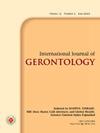韩国各年龄组自杀未遂者的特征和致死率:回顾性单中心研究
IF 0.3
4区 医学
Q4 GERIATRICS & GERONTOLOGY
引用次数: 0
摘要
背景:自杀是世界范围内死亡的一个主要原因。虽然已经对自杀行为的预测因素进行了研究,但这些研究并没有涵盖死亡率和各种预测因素在年龄上的差异。我们在本研究中探讨了这些年龄差异。方法:回顾性分析2017年9月至2018年8月韩国首尔某大学医院急诊科(ED)自杀患者的医疗记录。我们从韩国国家急诊科信息系统和他们的个人电子医疗记录(emr)中提取了参与者的数据,包括人口统计信息(如年龄、性别)、急诊科就诊细节(如自杀方式)和病史(如身体疾病、共摄入酒精)。我们还使用EMR数据完成风险救援评定量表(RRRS)。结果:在就诊于急诊科的499名自杀未遂患者中,有427人被分析。我们发现,虽然年轻的参与者更有可能重复尝试,但年长的参与者的尝试更有可能是致命的(例如,更高的RRRS风险评分和更低的可及性救援评分)。在调整了人口统计学因素后,年龄较大的参与者在RRRS风险、意识受损和所需治疗方面的得分明显高于年轻参与者。结论:我们的研究结果澄清了基于年龄的高风险自杀企图者的特征,这可能会影响自杀预防政策(例如,年轻人倾向于重复自杀企图,因此可能需要持续监测)。然而,由于老年人表现出更高的死亡率和更难以拯救,他们可能需要自杀预防和社会支持干预。本文章由计算机程序翻译,如有差异,请以英文原文为准。
Characteristics and Lethality of Suicide Attempters by Age Group in Korea: Retrospective Single-Centered Study
Background: Suicide is a major cause of death worldwide. While studies have been conducted on the predictors of suicide behaviors, these have not covered how lethality and the various predictors differ by age. We explored these age differences in the present study. Methods: We retrospectively reviewed the medical records of suicidal patients in the emergency department (ED) of a university hospital in Seoul, South Korea, between September 2017 and August 2018. We extracted participants' data from the National Emergency Department Information System of Korea and their individual electronic medical records (EMRs), including demographic information (e.g., age, gender), details of their ED visit (e.g., suicide method), and medical history (e.g., physical illness, alcohol co-ingestion).We also used EMR data to complete the Risk-Rescue Rating Scale (RRRS). Results: Of the 499 patients referred to the ED for suicide attempts, 427 were analyzed.We found that while younger participants were more likely to have repeated attempts, older participants' attempts were more likely to be fatal (e.g., higher RRRS risk scores and lower accessibility-to-rescue scores). After adjusting for demographics, older participants showed significantly higher scores on RRRS risk, impaired consciousness, and treatment required than younger participants. Conclusion: Our findings clarified the characteristics of high-risk suicide attempters based onage, which could influence suicide-prevention policies (e.g., younger people tend to repeat suicide attempts, and thus may require continued surveillance). However, as older adults showed higher lethality and were more difficult to save, they may require suicide prevention coupled with social support interventions.
求助全文
通过发布文献求助,成功后即可免费获取论文全文。
去求助
来源期刊
CiteScore
0.60
自引率
0.00%
发文量
0
审稿时长
6-12 weeks
期刊介绍:
The Journal aims to publish original research and review papers on all fields of geriatrics and gerontology, including those dealing with critical care and emergency medicine.
The IJGE aims to explore and clarify the medical science and philosophy in all fields of geriatrics and gerontology, including those in the emergency and critical care medicine. The IJGE is determined not only to be a professional journal in gerontology, but also a leading source of information for the developing field of geriatric emergency and critical care medicine. It is a pioneer in Asia.
Topics in the IJGE cover the advancement of diagnosis and management in urgent, serious and chronic intractable diseases in later life, preventive medicine, long-term care of disability, ethical issues in the diseased elderly and biochemistry, cell biology, endocrinology, molecular biology, pharmacology, physiology and protein chemistry involving diseases associated with age. We did not limit the territory to only critical or emergency condition inasmuch as chronic diseases are frequently brought about by inappropriate management of acute problems.

 求助内容:
求助内容: 应助结果提醒方式:
应助结果提醒方式:


